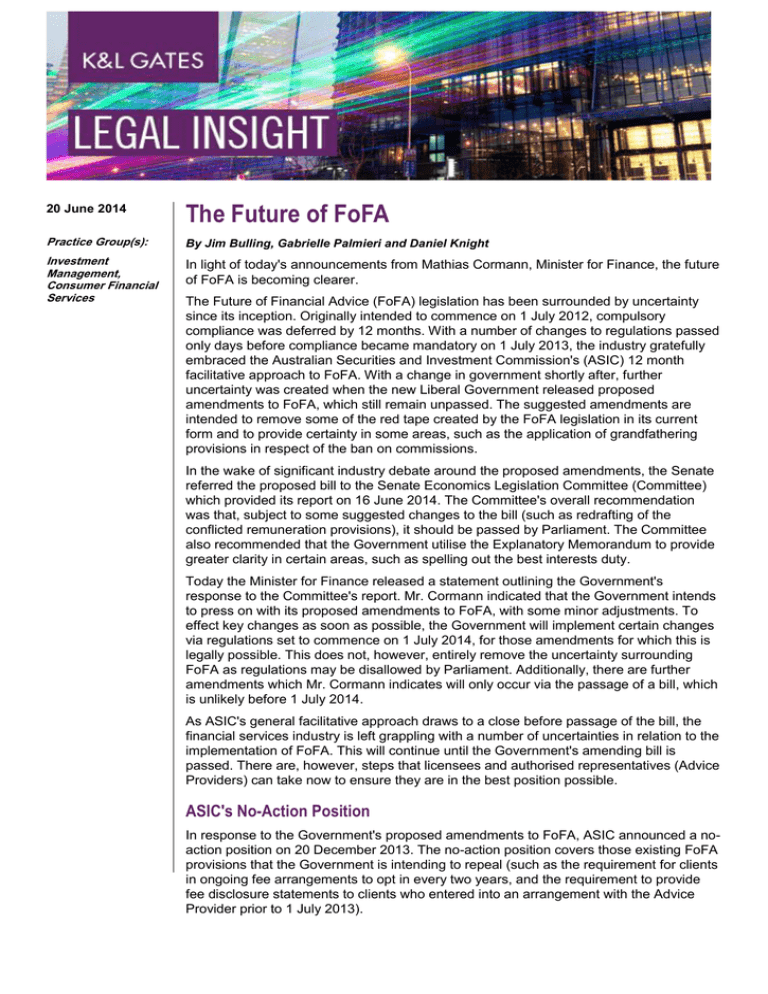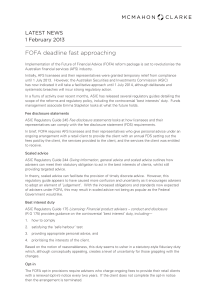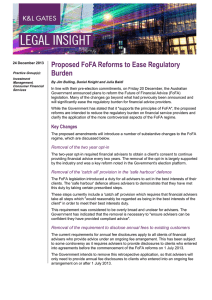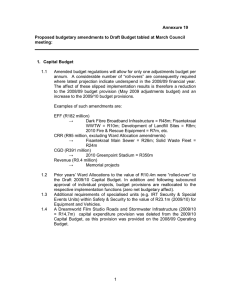
20 June 2014
The Future of FoFA
Practice Group(s):
By Jim Bulling, Gabrielle Palmieri and Daniel Knight
Investment
Management,
Consumer Financial
Services
In light of today's announcements from Mathias Cormann, Minister for Finance, the future
of FoFA is becoming clearer.
The Future of Financial Advice (FoFA) legislation has been surrounded by uncertainty
since its inception. Originally intended to commence on 1 July 2012, compulsory
compliance was deferred by 12 months. With a number of changes to regulations passed
only days before compliance became mandatory on 1 July 2013, the industry gratefully
embraced the Australian Securities and Investment Commission's (ASIC) 12 month
facilitative approach to FoFA. With a change in government shortly after, further
uncertainty was created when the new Liberal Government released proposed
amendments to FoFA, which still remain unpassed. The suggested amendments are
intended to remove some of the red tape created by the FoFA legislation in its current
form and to provide certainty in some areas, such as the application of grandfathering
provisions in respect of the ban on commissions.
In the wake of significant industry debate around the proposed amendments, the Senate
referred the proposed bill to the Senate Economics Legislation Committee (Committee)
which provided its report on 16 June 2014. The Committee's overall recommendation
was that, subject to some suggested changes to the bill (such as redrafting of the
conflicted remuneration provisions), it should be passed by Parliament. The Committee
also recommended that the Government utilise the Explanatory Memorandum to provide
greater clarity in certain areas, such as spelling out the best interests duty.
Today the Minister for Finance released a statement outlining the Government's
response to the Committee's report. Mr. Cormann indicated that the Government intends
to press on with its proposed amendments to FoFA, with some minor adjustments. To
effect key changes as soon as possible, the Government will implement certain changes
via regulations set to commence on 1 July 2014, for those amendments for which this is
legally possible. This does not, however, entirely remove the uncertainty surrounding
FoFA as regulations may be disallowed by Parliament. Additionally, there are further
amendments which Mr. Cormann indicates will only occur via the passage of a bill, which
is unlikely before 1 July 2014.
As ASIC's general facilitative approach draws to a close before passage of the bill, the
financial services industry is left grappling with a number of uncertainties in relation to the
implementation of FoFA. This will continue until the Government's amending bill is
passed. There are, however, steps that licensees and authorised representatives (Advice
Providers) can take now to ensure they are in the best position possible.
ASIC's No-Action Position
In response to the Government's proposed amendments to FoFA, ASIC announced a noaction position on 20 December 2013. The no-action position covers those existing FoFA
provisions that the Government is intending to repeal (such as the requirement for clients
in ongoing fee arrangements to opt in every two years, and the requirement to provide
fee disclosure statements to clients who entered into an arrangement with the Advice
Provider prior to 1 July 2013).
The Future of FoFA
Importantly, it may not cover all of the Government's proposed amendments because any
amendment that is introduced as a new provision or a drafting amendment will not
expressly fall within the scope of the no-action position.
It is not clear how ASIC will approach these issues. The no-action position does not have
a specified expiry and we expect it to remain in place until amending legislation and
regulations are passed, with appropriate adjustments for any changes made to the drafts
previously released by the Government. The Government's response to the Committee's
report indicates that, at least in relation to the changes which may be made by regulation,
this should occur in the next few weeks.
Many in the industry are likely to be relying on ASIC's no-action position in relation to at
least some of the provisions flagged for repeal. As both the likely date for amendments
and the end of ASIC's general facilitative approach come closer, there are two things
Advice Providers should be considering:
the parameters of the no-action position and whether they have relied on it only in
relation to those provisions that have been flagged for repeal?
if they have the necessary processes and systems in place in the event that the final
amendments are different to what the Government has already announced
Where Advice Providers identify any issues with how they have applied the no-action
position or feel they may face difficulties in complying with FoFA requirements in the
event that the no-action position is withdrawn, they should prepare solutions which can
be implemented on short notice if needed.
Grandfathering
The FoFA 'grandfathering' provisions enable Advice Providers to continue to receive or
pay conflicted remuneration where it is provided under an arrangement that was entered
into prior to 1 July 2013.
The current language of the grandfathering provisions imposes a number of limitations on
the circumstances in which Advice Providers are able to rely on grandfathering of
benefits that would otherwise be classified as conflicted remuneration. Many of these
limitations will have an impact from 1 July 2014.
Advice Providers should ensure they are prepared for this and have considered
alternative methods for receiving such benefits.
Benefits provided under employment contracts
Benefits that constitute conflicted remuneration which are paid under employment
contracts entered into prior to 1 July 2013 are grandfathered until 30 June 2014. After
this date, a benefit paid under an employment contract will cease to be protected by the
grandfathering provisions regardless of when the employment contract was entered into.
AFSL holders should examine whether any payment that could be considered conflicted
remuneration, which is paid pursuant to an employment contract from 1 July 2014, is
carved out or exempt from the conflicted remuneration provisions, otherwise than by
grandfathering, for example under a balanced scorecard approach or the client paid
exemption.
2
The Future of FoFA
Benefits provided in relation to products acquired from 1 July 2014
The grandfathering provisions that relate to benefits given on the acquisition of a financial
product differ depending on whether the person giving the benefit is acting in the capacity
of a platform operator or in some other capacity.
In both cases, benefits that constitute conflicted remuneration which are payable
pursuant to arrangements entered into since 1 July 2013 have not been permissible
since that date. However, from 1 July 2014, even for benefits paid under arrangements
entered into prior to 1 July 2013, grandfathering will fall away in certain circumstances.
In the case of platform operators, if the benefit relates to the acquisition of a financial
product by a person who opened (or provided instructions to open) an account on the
platform after 1 July 2014, it will not be grandfathered.
In the case of a person other than a platform operator, if the benefit relates to the
acquisition of a financial product or the provision of a financial service from 1 July 2014, it
will also not be grandfathered from this date.
Advice Providers should ensure they have carefully reviewed all benefits to determine
whether the grandfathering provisions will continue to apply.
Grandfathered benefits where there is a change in licensee
One important amendment proposed by the Government is a broadening of the
grandfathering provisions in relation to authorised representatives who change licensees,
or Advice Providers who sell their business.
Under the current draft language of FoFA, the grandfathering of benefits paid under
arrangements entered into prior to 1 July 2013 may fall away in circumstances where it
will result in a 'new' arrangement being entered into by the new licensee or the purchaser
of the business. This has been an issue for financial planning practices, which faced
risking their grandfathered commissions if they were to switch dealer group or licensee.
The Government's proposed changes will address this by amending the regulations to
specify that:
in circumstances where an authorised representative changes licensees, a benefit
that would otherwise be grandfathered will continue to be so
a person who purchases a business has the same rights the seller would have
retained had the seller not sold the business.
These proposed amendments were broadly welcomed by the industry but do not fall
within the scope of ASIC's no-action position. Mr. Cormann's statement indicates that the
Government intends to make these changes via regulations and they will take effect from
1 July 2014. Authorised representatives and persons thinking of purchasing business
should take these proposed changes into account and, in particular, consider the timing
of any such action. For any period between the time at which they take that action and
the time these regulations are passed (for example, if the practice changes licensee
before the amendments are passed), certain benefits may not be grandfathered and
therefore may not be permissible unless another exemption applies. When relying on
these changes to be made by regulation, Advice Providers may wish to consider the
period during which regulations may be disallowed.
3
The Future of FoFA
Best Interests Duty Safe Harbour Steps
The 'best interests duty' simply requires an adviser to act in the best interests of the client
in relation to any personal advice the adviser is providing. In order to assist advisers in
complying with such a broad duty, the FoFA provisions set out a series of safe harbour
steps.
These safe harbour steps require advisers to consider relevant information and personal
circumstances, the adviser's expertise and appropriate products. A 'catch-all' step also
requires the adviser to take "any other step that…would reasonably be regarded as being
in the best interests of the client". If an adviser can demonstrate he or she has complied
with each of the safe harbour steps, he or she will be deemed to have complied with the
best interests duty. This also means that if an adviser is unable to demonstrate that he or
she has complied with one or more of the safe harbour steps, it will be difficult to
convince the regulator or any forum in which a complaint is brought that the adviser acted
in the client's best interest.
The legislation does not include any requirement to maintain evidence that an adviser
has complied with each of the safe harbour steps. However, in the lead up to 1 July 2014
and the end of ASIC's facilitative approach, Advice Providers should carefully consider
the processes and systems they have in place to support individual advisers in
evidencing each of the actions they have taken to meet the safe harbour steps. This may
include updating Statement of Advice templates, improving file note storage and
additional training for advisers.
The removal of the very broad catch-all safe harbour step (in section 961B(2)(g) of the
Corporations Act 2001) is effected by the proposed amendments and was highlighted by
the Government as one of the key amendments to FoFA. This amendment was also
supported by the Committee in its report and Mr. Cormann's statement makes it clear
that the Government still intends to make this change. Currently the ASIC no-action
position will treat the catch-all step as having been repealed, although this will not
prevent a person (other than ASIC) in taking action against an Advice Provider for failing
to take all steps reasonably required.
In reviewing the methods by which compliance with the safe harbour steps will be
evidenced, Advice Providers should take the catch-all step into consideration in the event
that this amendment to the legislation is not passed.
Staying Up to Date with the Changes
One of the most important matters for Advice Providers to address in the lead up to 1
July 2014 and beyond is to ensure that they keep up to date with FoFA developments.
Mr. Comann's statement provides insight into the Government's intention moving
forward, however the final outcome will depend on the Government's support in
Parliament for its proposed amendments. Many of the proposed amendments will ease
the burden Advice Providers face under the current FoFA legislation and Advice
Providers will want to be in a position to take advantage of them if they are passed. For
example, if suggested changes to the stamping exemption are passed, Advice Providers
may be able to receive stampings fees in relation to Real Estate Investment Trusts
(REITs) and Listed Investments Companies (LICs).
In addition to the rolling back of certain aspects of FoFA, some of the proposed
amendments are technical changes and Advice Providers should ensure they are across
these changes and any impact they may have on the licensee's FoFA solutions. Many of
4
The Future of FoFA
the changes of this nature are intended for clarification purposes and not as substantive
changes, but it would be prudent to follow developments related to these issues.
One area of particular interest to many Advice Providers is the general advice exemption
from the ban on conflicted remuneration. This exemption has been criticised as allowing
non-personalised financial product advice to be remunerated through volume based
benefits, including commissions. Mr. Cormann's statement indicates that the exemption is
intended to apply more narrowly than this. These comments will be welcomed as this
proposed amendment has caused heated debate in the industry, with many stakeholders
arguing that it will encourage advisers to give general rather than personal advice and
reopen the door for the widespread payment of commissions. The Committee
recommended that the Government consider redrafting the provisions governing
conflicted remuneration, using the Explanatory Memorandum to clarify the Government's
intention. In addition, the Committee recommended that the Government make the
distinction between the terms 'information', 'general advice' and 'personal advice'
sharper. This could have significant implications beyond FoFA. In any event, the
provision of 'information' only is not subject to the ban on conflicted remuneration. Mr.
Cormann's statement indicates that there will be further changes to the proposed
amendments which the industry has not yet seen. These include restrictions around
when commissions can be received, including in relation to general advice. Until the
amendments are passed, under the current language of the conflicted remuneration
provisions, general advice remains subject to the ban.
Advice Providers should be actively watching for updates and seeking legal advice where
they are unsure of the impact of any changes.
Conclusion
The industry is eagerly awaiting resolution on the proposed amendments to the FoFA
legislation, which may depend in large part on how the Government seeks to implement
its amendments.
Until then, Advice Providers must do their best to operate within the uncertain
environment they face. Doing so means being aware of the existing FoFA law, the
potential impact of any changes and staying on top of the movements as they occur.
Authors:
Jim Bulling
jim.bulling@klgates.com
+61.3.9640.4338
Gabrielle Palmieri
gabrielle.palmieri@klgates.com
+61.3.9205.2086
Daniel Knight
daniel.knight@klgates.com
+61.3.9640.4324
5
The Future of FoFA
Anchorage Austin Beijing Berlin Boston Brisbane Brussels Charleston Charlotte Chicago Dallas Doha Dubai Fort Worth Frankfurt
Harrisburg Hong Kong Houston London Los Angeles Melbourne Miami Milan Moscow Newark New York Orange County Palo Alto
Paris Perth Pittsburgh Portland Raleigh Research Triangle Park San Diego San Francisco São Paulo Seattle Seoul Shanghai
Singapore Spokane Sydney Taipei Tokyo Warsaw Washington, D.C. Wilmington
K&L Gates practices out of 48 fully integrated offices located in the United States, Asia, Australia, Europe, the Middle East and
South America and represents leading global corporations, growth and middle-market companies, capital markets participants and
entrepreneurs in every major industry group as well as public sector entities, educational institutions, philanthropic organizations
and individuals. For more information about K&L Gates or its locations, practices and registrations, visit www.klgates.com.
This publication is for informational purposes and does not contain or convey legal advice. The information herein should not be used or relied upon in regard to any particular
facts or circumstances without first consulting a lawyer.
©2014 K&L Gates LLP. All Rights Reserved.
6



